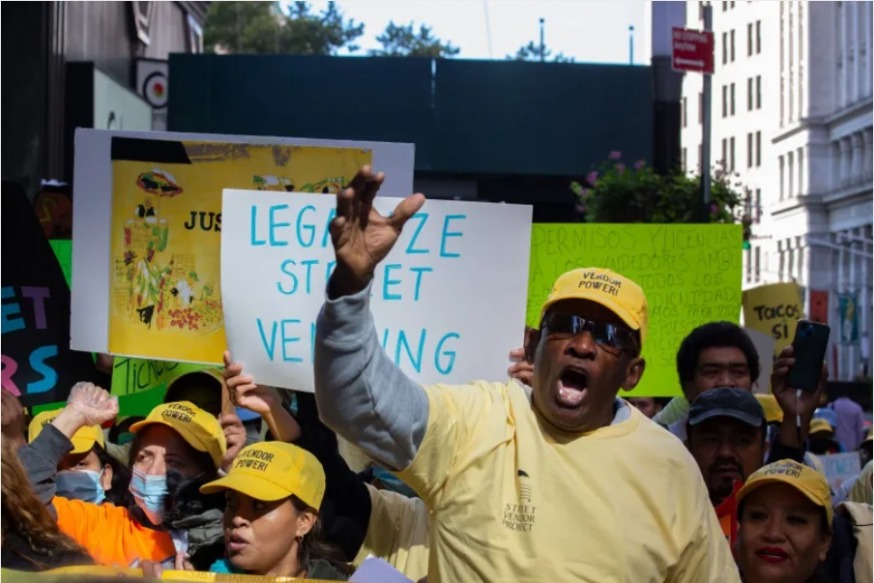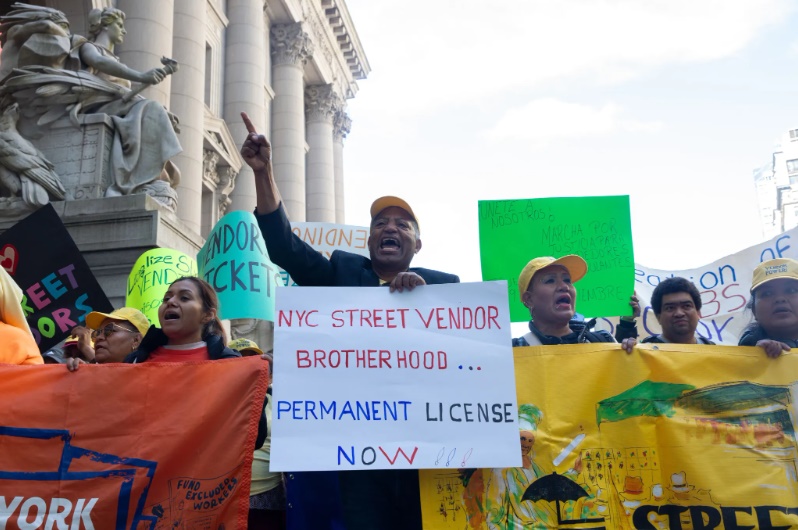
Dozens of street vendors protest in lower Manhattan. As tickets mount, many vendors feel like they’re being punished by the Adams administration for not having a permit even as they have no way to get a permit. Ben Fractenberg/THE CITY

This article was originally published by The CITY on Sept. 29
Street vendors angry about a long delay and a broken process for receiving promised new permits on top of what they say is a sharp rise in ticketing marched outside City Hall on Thursday.
The protesters, joined by a handful of City Council members, called for new laws to protect them and demanded better treatment from agencies in the Adams administration.
The number of food vending permits was scheduled to increase for the first time in decades on July 1, after legislation passed in early 2021 mandated 445 permits be released each year for the next 10 years.
That will eventually double the current number of mobile food vending permits, which had been capped at 5,100 for decades, leading many outdoor entrepreneurs to pay a steep price to work using someone else’s license.
The new law is supposed to annually create 100 permits that can be used city-wide, 300 limited to the outer boroughs, and 45 for disabled veterans.
But little has changed since THE CITY reported in mid-July that the Department of Health and Mental Hygiene (DOHMH), which oversees food cart licensing, had yet to make any new permit applications available.
Over the years, the scarcity of permits created an underground system, where vendors paid tens of thousands of dollars to lease a permit from its holder. That was supposed to change after 2021, with new legislation taking ticketing enforcement away from the NYPD and giving those vendors an opportunity to apply for their own permits.
Desperately Seeking Permits
Three months after those permits were supposed to be available, the Department of Health is still struggling to work out its process and, despite the new legislation, police are continuing to issue tickets.
“My history as a street vendor is beautiful but also stressful,” said Saraí Rodriguez, a 37-year-old who has been renting a permit for her Mexican food cart in Midtown for $20,000 for two years.
Rodriguez told THE CITY via an interpreter at the protest, where vendors chanted slogans in Spanish and English and mingled with one another before sharing churros at the end that one vendor shared from her cart. “I’ve spent most of my time as a street vendor not working for myself but working for somebody else.”

Ben Fractenberg/THE CITY
Rodriguez said she has never spoken to the person she’s leasing her permit from. Instead, she pays a broker, who collects a fee and delivers the remainder of the money to the permit owner. She doesn’t know how much money the broker keeps, but she knows the city-issued permit cost the owner $200 — or one percent of what she pays to use it.
“I always think to myself what would I be able to do if I wasn’t losing $20,000 to the permit owner,” said Rodriguez, a single mother. “It would mainly go toward the education of my oldest daughter, who just started college.”
Mohamed Attia, a leader of the protest and the director of the Street Vendor Project, a group that advocates for vendors, said health department officials told him a few weeks ago that the new permit applications likely would not be released until 2023.
According to Attia, DOHMH said it is revamping its plan to roll out permits based on comments some vendors made during a public hearing on June 30 — the day before the permit applications were scheduled to be released.
During that hearing, some vendors voiced concerns over how the permits were going to be distributed.
Distribution Solution Needed
According to the rules DOHMH put forth, the first 100 people on the waiting list would be offered citywide applications and the next 300 people would be offered outer-borough applications. No vendor on the waiting list would have a choice regarding application type.
Vendors who have been working in the same location for years suggested creating two waitlists instead — one for citywide permits and another for outer-borough permits — so they could have a shot at working where they wanted to.

Ben Fractenberg/THE CITY
“I’ve grown this customer base in Manhattan,” said Samya Eskander, a 66-year-old who’s been selling hotdogs and other foods before that on Canal Street for 15 years. Eskander testified at the hearing in June in favor of separate waitlists.
Speaking to THE CITY in Arabic this week, she added: “It doesn’t make sense for Manhattan vendors who’ve been here for over 10 years to get up and leave to go to a new borough. Every vendor should get to decide where they work.”
According to Attia, the DOHMH is taking this feedback into consideration and is working on creating two separate waitlists. To do this, they will reach out to vendors and give them 90 days to choose which waitlist they want to be on, he said.
“We were really frustrated,” Attia said. “We were like what happened? You guys had months to work on this.”
Asked about Attia’s claims, a spokesperson for DOHMH said, “We will comment when this is finalized.”
More generally, the spokesperson, who did not agree to be named, said, “We are working to finalize the rules, and applications will go out after the rules go into effect. The process is behind schedule, in part because we want to be responsive to the public comments we received on the proposed rules, and give this feedback the deliberation it deserves. We are working as quickly as we can.”
Councilmember Shahana Hanif, who attended the rally, told THE CITY that to her knowledge, the health department has not reached out to vendors since the law initially passed. Department officials are only now offering to engage with advocates, Hanif said.
“It hasn’t been transparent, and we’re looking to DOHMH to correct this and urgently begin issuing the new licenses,” she added.
‘Artificial Scarcity’
The delays come as 1,189 budget positions at DOHMH were unfilled as of June, giving it a 19.1% vacancy rate that’s the second highest percentage of any city agency or department as the city has struggled to fill open roles and, at times, to provide services related to those roles.
While vendors wait for the new permit applications, they are experiencing a rise in ticketing.

Street vendors tape a list of demands to a wall at the city’s consumer and worker protection agency’s Lower Manhattan’s building. Ben Fractenberg/THE CITY
In statements to THE CITY, both agencies acknowledged their partnership, with DWCP saying it “is committed to an education first approach to vending that includes the opportunity to comply before issuing violations” and that it ”enlists support from NYPD in areas with significant and repeated noncompliance, including in locations where inspectors have been threatened with violence.”
But as tickets mount, many vendors feel like they’re being punished by the city for not having a permit even as they have no way to get a permit.
“The city has created an artificial problem of scarcity by limiting the number of licenses,” Councilmember Shekar Krishnan (D-Queens), who spoke at the protest, told THE CITY later in the day. “We made it more difficult for people to earn a living and on top of that, we’re increasing enforcement on them.”
Other councilmembers in attendance included Democrats Sandy Nurse and Christopher Marte of Brooklyn and Kristin Richardson Jordan of Manhattan.
Expressing frustration about the cap on permits and the increase in enforcement, protesters on Thursday hung banners outside DCWP, DOHMH, and the Department of Small Business Services, listing their demands.
They called on City Council to lift the cap on food vending permits altogether, end police enforcement, establish a division within SBS dedicated to vendor services and create more legal locations for vending.
State Sen. Jessica Ramos (D-Queens), speaking at the protest, called out Mayor Eric Adams for falling short of his boasts about being business-friendly.
“Don’t just be a mayor for big businesses,” Ramos said. “Our smallest business owners are looking for dignity and the legalization of their businesses.”
THE CITY is an independent, nonprofit news outlet dedicated to hard-hitting reporting that serves the people of New York.






